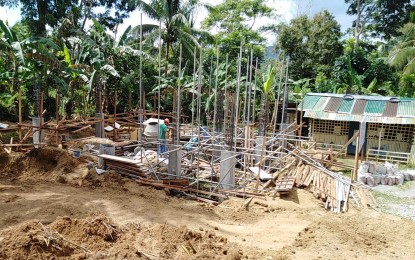
NEW SCHOOL BUILDING. The ongoing construction of a new school building beside the old makeshift rooms in San Agustin village in Maasin City, Southern Leyte. The PHP8.79 million, three-classroom project has started on Sept. 26, 2019, and up for completion in early January. (Photo courtesy of Department of Public Works and Highways)
TACLOBAN CITY -- Some 150 pupils of San Agustin Elementary School in Maasin City will no longer hold classes in classrooms made of wood and bamboo once the Department of Public Works and Highways (DPWH) completes the construction of the new school building.
The PHP8.79 million, three-classroom project has started on Sept. 26, 2019, and up for completion in early January. It is funded under the Basic Educational Facilities Fund of the Department of Education (DepEd).
In a phone interview on Wednesday, DPWH Southern Leyte district chief Ma. Margarita Junia said the pupils and teachers in this school are enduring the heat as they use makeshift classrooms.
“We have visited the school and it was heartbreaking to see the children in a terrible situation. That is why we need to address this issue,” Junia said.
The school is located in San Agustin village, a remote community, 23 kilometers upland from the city center of Maasin.
The basic structural components of the school building such as columns, footings, and beams will be expanded to withstand earthquakes and typhoons.
The new learning facility is disaster-resilient based on the upgraded standard design agreed on by DPWH and DepEd.
As mandated by the government, both agencies play a big part in improving the quality of education in the country through the construction of better and more conducive learning facilities.
In addition, DepEd vowed to prioritize the development of public schools in geographically isolated and disadvantaged areas for them to meet the basic criteria set for learning institutions in the Philippines. (PNA)
